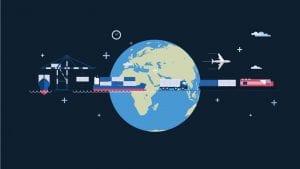How do communications security choices impact your sustainability aspirations?

Here’s a staggering statistic from academics at Loughborough University: “Data centers consume more power than the entire UK,” and 65% of the data that is stored on these data centers is “dark data” – data which is used once or not at all. It is estimated that the CO2e emissions required to power up those data centers – due to dark data alone – is equivalent to more than three million flights from London to New York. This is a huge environmental impact at the expense of useless data and computation.
Many of the solutions in the market today are data and engagement-driven – for example, you buy data storage packages and your emails are pushed constantly with little filtering. If we look at emails alone, the data mountain is massive. There were approximately 4.147 billion email users in 2021, as compared to 4.03 billion users in 2020. Consider too how many of us have multiple email accounts and think also how many of these emails are junk.
Tech companies build their business models by monetizing the data that is collected from users and shared with third parties. These platforms require more data; more engagement; more consumption; more storage and more computation. More means more environmental impact.
It is predicted that the ICT sector will be responsible for 14 percent of global CO2e emissions by 2040 and is one of the fastest growing sectors for this, according to The European Commission. But there are alternatives. ICT – and specifically communication platforms – don’t have to have a hefty environmental price tag.
How privacy regulations help build sustainable products
Gartner predicts that by year-end 2024, 75% of the world’s population will have its personal data covered under modern privacy regulations, where data minimization and responsible computation are key requirements. Indeed GDPR, which was adopted in the EU in 2016, specifically states that “data controllers should collect only the personal data they really need, and should keep it only for as long as they need it”.
Reducing unneeded data and computation has a direct positive impact in helping reverse global warming, as well as protecting people’s privacy. Secure communication applications, or ICT products in general, can be built around this simple mindset to serve for the greater good by being more mindful about the data and computation they require.
Here is a simple road map for tech builders to deliver more impactful products:
Start with the business model
Companies must start looking at their business as a whole. Instead of data-driven business models, we should all consider less data-intensive and transparent business models for sustainability and privacy. Once the businesses are liberated from the burden of monetizing data, they automatically start producing more sustainable and privacy-centric products. Subscription-based services, rather than fully freemium ones, are usually the ones who do not directly rely on people’s data for monetization.
Reducing computation
How much computational power our devices are using every day, in fact, every minute is often shocking to companies. According to Energuide.be, a desktop computer that is on for eight hours a day uses almost 600 kWh and emits 175 kg of CO2 per year. Even in standby mode, computers continue to consume power. Smartphones are greener, though their total number globally is more than desktop computers. The majority of ICT companies’ carbon footprint comes from end user emissions on mobile phones and desktop computers. This must be measured, decarbonized and offset. Key to the technology platforms, therefore, is reducing computation, as this equates to reduced CO2e emissions, as well as less sensitive information being leaked.
Data hoarding
Connected to this, but even more of an issue, is the gargantuan amounts of data companies (and individuals) are storing. Go against the tide and design products to minimize data including giving clients the option of deleting their app data and metadata automatically from the servers, logs and devices. This is not only good for security and regulatory compliance but also for sustainability.
Raising productivity and mental fitness
Minimizing data, curating communication and cutting computation – hence distractions – also have a huge impact on productivity. In March, WhatsApp proudly announced that, on average, its users send seven billion voice messages daily; and this is just one of the tools that we use to communicate each day.
Allow users to be selective about their connections and to create a curated contact list. Enable people to prioritize notifications to reduce unnecessary noise, which also decreases the computation on their mobile devices. This not only gives a more private and organized communication experience, but it also reduces unnecessary communication and spam.
Design decisions like these are rooted in a desire to simplify users’ experiences to maximize their time and keep their communications secure but it all comes back to sustainability. Tools need to be minimal, essential and mindful – honed simplicity – to help companies work efficiently in a world full of noise and distraction. You can get more secure communications; a more effortless interface and more peace of mind but at considerably less cost to our planet.
Aim towards Net Zero
Finally, set your corporate objectives to become netzero. Start measuring your scope 1/2/3 footprint, decarbonize and offset – credibly, transparently and in a socially responsible way. As you look at how your business operates, you will quickly see that eco ambitions feed into everything your company does, including privacy.
